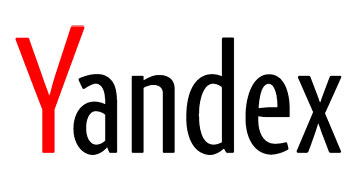The Internet is a huge number of different sites. Although many of them refer to each other, this is not enough. In such a case, and there are search engines that allow you to find the necessary data in the entire network. With you again Maxim Matveyev, and today we will talk about search engines.
I think almost all users starting to learn, first go to the search engines. This is natural, because otherwise we have no more convenient way to navigate the network. I also searched for information for the first time using this tool. If I'm not mistaken, I simply wanted to find some kind of book.
However, after I entered the query and got the desired result, I seriously thought. Indeed, in search engines there are hundreds of millions of people every day. Let not all of them are looking for the same thing, requests like “movies” or “games” have a huge audience. And almost all of it gets these sites, located on the first places of the search!
Then for me it was a revelation. I thought that they were just incredibly lucky, so they might be lucky for me too. That is how I began to take my first steps. Now I understand that to achieve such a result, you need to work. and - this combination allows you to reach unprecedented heights in the search, getting a large number of visitors from search engines. But for this you need to understand the principle of their work.
What is a search engine?

What is a search engine? This, which allows you to find specific information. But if everything is superficially clear, then gradually you begin to think: “How does he do it”?
The principle of operation of such services is quite simple. They represent a huge database containing all the information about sites on the Internet. When the user enters a text query, all the relevant results are checked and the selection of the variants with the most appropriate query is performed. In other words, if the text on a certain resource contains the required phrase, then this resource is considered to be suitable. As a result, the issue is formed, which allows the user to find the information he needs.
In fact, everything is a little more complicated, but the general idea corresponds to this one. The main and most difficult task of this service is not just to find a phrase on the Internet, but to make a competent issue that would completely satisfy the user. This is also called the word “relevance” - matching the output to the user's expectations.
For the formation of the issue, various factors are used by which each resource is evaluated.
Among them:
- Text quality;
- Age of the resource;
- Resource optimization;
- Number of inbound links
- The trust ().
And much more. Improving all of these indicators - the main task in search engines.
What are the most common search engines

So, with the definition of search engines, we have already figured out. Yes, and the most famous of them you probably know. However, in fact there are many more than you can think of. In the world there are dozens of search services used to find information. Although most of them are used only for regional needs (like Yandex for the CIS), there are global options.
Among the most common options worth noting:
- Google;
- Bing;
- Yahoo;
- Rambler;
- Mail.ru.
Of course, this list applies mainly to Russia and the CIS. In the world, the situation is slightly different, the second place is occupied by the Chinese service Baidu. But we do not have to work with him, so do not bother. The main popularity in the CIS are only two systems - Google and Yandex, and the rest are auxiliary. But even in this situation, you should not neglect them, because they are also used by a certain audience.
Google and Yandex account for 90% of the audience. This is a significant indicator, so the optimizers focus on these services. In third place, not surprisingly, is Mail.ru. Although he is not very popular, he manages to provide about 7% of the traffic on the network. Next come Bing, Rambler and Yahoo. The audience of each of them does not reach 1% in the CIS.
But remember that even 1% is a huge number. In Russia, if you look at the active users of the network, it exceeds 1 million people. Therefore, it is important to pay optimization in other search engines.
In the future, of course, I’ll probably sort out all the options presented, but for now we’ll consider only two main, leading search engines.
Yandex search engine

Yandex is the largest search engine in Russia, but it is also popular in the CIS. According to liveinternet statistics, its audience share in runet is 50%, which is 10% higher than Google’s share in the same region. Therefore, it is considered a priority for Russian users.
Yandex is not only a search engine. Now it contains a lot of services that facilitate the search, and sometimes completely replace it. These services include weather, transport timetable, purchase of tickets and much more. In addition, he has his own mail system, which is used by many users.
If you look from the point of view of the webmaster, then Yandex is a very convenient option for a regional project. Due to its high popularity in the CIS, it can be used to sell various services, promote regional projects and the like. The main audience is Russian-speaking, but at the same time collected from many nationalities. This opens up great opportunities for the development of sites.
However, foreigners rarely use this service. Therefore, it is better not to use it to promote various international portals. Although he will give a good result, Google is better suited for such tasks.
Google search engine

Google is the largest and most famous search engine. If you look around the world, its audience share is slightly less than 70%. Although almost every region has any alternatives to this service, it still has great popularity around the world.
Like Yandex, Google has its own mail service, as well as many other functions. An important fact: this company is the owner of the Android mobile operating system. Why important? Yes, because already more than half of the traffic on the network comes from mobile devices, in most cases from Android. Since the company has the rights to it, it will make use of Google as convenient as possible for its users.
And indeed, now the company is moving towards mobile search. Therefore, resources that focus on the mobile audience, should first be promoted in Google. As for the share of mobile devices in Yandex, it does not reach even a quarter.
Also, Google is convenient for promotion on the world stage. Users from all over the world can become your visitors, if your resource is suitable for this. This is very promising if you create a large international project.
Finally, I will say: you should not choose one option. If you decide to promote your site, it should be done comprehensively. Neglecting other search engines, you immediately lose a huge part of the potential audience, which will significantly slow down the development of your resource.
And what search engine is priority for you? What advise when promoting in Google and Yandex? Share your experience in this area.
With you was Maxim Matveyev. Develop and do not neglect the advancement in search engines. And also subscribe to my blog to read new articles.
Going to the Internet, reading the news or going to the post office, you use the services of a browser installed on your personal computer. However, the search on the Internet, he does not independently, but with the help of special search engines.
Definition
So what is a search engine in terms of a system administrator? Generally speaking, this is a system designed to search for information. More official terms - it is a software and hardware complex designed to search data on the Internet. There is a sufficient number of interfaces for this purpose for every taste. Usually the user selects the most convenient interface and uses it all his life.
By itself, a search engine consists of a search robot that searches for information on sites; an indexer that provides the fastest search and output of the highest quality results; and a graphical user interface. Consider some popular information systems and their interfaces.
Search engine
Being graphical browsers provide user interaction with search engines. The very first browser with which any user who has bought a computer, is Internet Explorer, is familiar. However, usually no one lingers on it for a long time, because very often there are failures in his work, delays in processing information, and the search results do not always satisfy the interests of the user. Therefore, people usually start using search engines with a more user-friendly interface.

If you want to change the browser, be sure to consider using FireFox. Convenient and fast to work, it rarely changes to other interfaces. Appeared in 2004, a free browser quickly gained popularity, but it didn’t compare with Google, which produces a browser and its own search engine. The only advantage is that rarely anyone writes viruses on FireFox.
The leader among browsers is considered the search engine Google. The most convenient interface, its own built-in search engine and a friendly user interface make it possible to win the heart of the consumer from the first minute of operation in this browser.
For mobile devices, Opera or OperaMini will be the best choice. Convenience of working with bookmarks allows the user to work much faster in this browser on the phone than with any other interface.
IPS
Before proceeding to the consideration of search engines on the Internet, let's understand the concept, In general, such a system can be called any application or interface that gives the user a search result in information storage systems and databases. There are 2 types of IPA.
- Documentary. The search in these systems is carried out not by the information itself, but by special indexed codes like libraries, when they first look at the card of the book, and only then find the book itself by it.
- Factual. Here, the search is performed in the same way, not for a specific file, but for some facts about it.
Leader
When talking about information systems, it is impossible not to mention the leader among them. This is without a doubt the Google search engine. According to 2014, more than 68% of users prefer to use this particular search engine. Based on this search engine contains more than 60 trillion documents.

Began in 1996 as a learning project for Larry Page and Sergey Brin. Their system is based on the method of OCD, the so-called method of transparent management, which became the basis of the company's development for many years.
What is "Google" in terms of the average user? This is a convenient, and most importantly - clean interface, without a lot of advertising on the main search page. The system of accounts that allows you to store data on the pages viewed, and bookmarks in the virtual space, and it does not matter which device you came from. After Google bought the Android company, it became possible to integrate all their devices into a single network using an account system.
Yandex
And how do they answer the question in Russia, what is a search engine? In our country, the development of Internet technologies also did not stand still. This can be seen on the mastery of users of various browsers. So what is the search engine "Yandex"? In Russia, there is a sophisticated search engine with many integrated functions, such as an online wallet (by the way, not supported by most popular online stores and services), a fairly good card service, though not comparable to Google. There is even an application that should show traffic jams, but, as is often the case, a good idea turned into a farce, because traffic information is updated too long.

On top of that, the main search window is crammed with news, weather and other gadgets that are absolutely not necessary for a person who has come to the Internet to find, for example, his favorite song.
Caution virus
It would seem, what harm can do a search engine? However, there is one IRS, which is nothing more than a pest. It is called Webalta. We give some of its features, and you yourself decide what the search engine Webalta.
Roughly speaking, we can safely say that today the Internet is huge "dump", where you can find any information that is useful and not very, whatever it was !!! But for effective information retrieval, some tools are needed. After all, there are millions of sites, among which the newbie is simply lost!
In order to rank information by request, there are online search engines. These are services that can help you find the information you need in a split second.
Search engines are real carriers of information on the Internet. They know about the existence of all sites that you may need.
 To get a general impression of the search engine, you need to use it at least half an hour. You will immediately understand the enormous opportunities that these search engines open up for us.
To get a general impression of the search engine, you need to use it at least half an hour. You will immediately understand the enormous opportunities that these search engines open up for us.
Essentially, what is a search engine ??? This is a site that loads information about other sites into its database and, if necessary, gives it to us. For example, a search engine knows hundreds of websites on computers and if we ask it to provide us information on, then it will find such sites in its database in half a second and give us them in order of utility. The first in the list will be the site, which, in his opinion, best of all tells about installing Windows from a flash drive. And so with any key request. At least about the repair, at least about the garden, at least about the animals and so on!

Today, the most popular search engine on the Russian Internet is Yandex. And if we talk about the coolest search engine in the world, then of course Google!!! Google is a good corporation!
Search system - software and hardware with a web interface that provides the ability to search for information on the Internet.
All search engines are united by the fact that they are located on dedicated powerful servers and are tied to effective communication channels. Search engines are also called information retrieval systems (IPS). The number of simultaneously served visitors to the most popular systems reaches many thousands. The most famous service daily millions of customers. In cases where the search engine is based on a directory, it is called a directory. It is based on the work of moderators. The basis of the IPS with full-text search is the automatic collection of information. It is carried out by special programs. These programs periodically examine the contents of all Internet resources. To do this, they move, or as they say, crawl, on different resources. Accordingly, such programs are called robots. There are other names: since WWW is the abbreviation of the expression World Wide Web, it’s natural to call such a program a spider in English. - spider. Recently, other names have been used: automatic indexes or directories. All of these programs explore and "download" information from different URLs. Programs of this type visit each resource after a certain time. No search engine is able to index the entire Internet. Therefore, the databases containing the addresses of the indexed resources are different for different search engines. Nevertheless, many of them strive, if possible, to cover in their work the entire space of the world network.
To search for information using a search engine, the user formulates a search query. Based on the user's query, the search engine generates a search results page. Such search results can combine various types of files, for example: web pages, images, video files. Some search engines also retrieve data from databases and directories of resources on the Internet.
The search and maintenance methods are divided into four types of search engines:
1. systems using search robots.
2. man-controlled systems
3. hybrid systems
4.meta systems.
The search engine architecture includes: a search robot that scans the Internet, an indexer that provides a quick search, and a search engine - a graphical user interface.
The goal of the search engine is to find documents containing either keywords or words in any way related to keywords. The search engine is the better, the more documents relevant to the user's request it will return.
Search Engine Examples
Google- one of the most complete and popular foreign IPS. A distinctive feature of the Google IPS is the technology for determining the degree of relevance of a document by analyzing links from other sources to this resource. The more links to a page on other pages, the higher its ranking in the Google IPS. Google uses the PageRank authority calculation algorithm. PageRank is one of the supporting factors of ranking sites in search results. PageRank is not the only, but very important way to determine the position of sites in Google search results. Google uses the PageRank index of the pages found on request to determine the order in which search results are returned to visitors in search results. In 2010, the company launched a voice search in Russia. To perform a search, you need to press the button on the phone next to the search line and say your request, the phone will send your voice to the server, and the browser will display a string with your recognized query and search results on it.
Yndex - The most popular at the present time domestic search engine. It began work in 1997. It maintains its own catalog of Internet resources. It is also the best search engine for identifying illustrations. The English version is provided with a directory of Internet resources. It has a comprehensive query generation system. In particular, it is allowed to enter a search prescription in a natural language - in this case, all the necessary extensions are made automatically.
In addition to web pages in HTML format, Yandex indexes documents in PDF (Adobe Acrobat), Rich Text Format (RTF), Word binary (.doc), Excel (.xls), PowerPoint (.ppt), RSS (blog and forums).
Mail.ru search enginestarted working in 2007. The volume of the index file in the spring of 2009 was more than 1.5 billion pages located on Russian-language servers. In addition to searching for texts, the system searches for illustrations and video clips posted on specialized "self-filled" Russian servers: Photo @ Mail. Ru, Flamber and the like. Gogo.ru allows you to limit your search to commercial-oriented sites, information sites, as well as forums and blogs. The "Advanced Search" form also allows you to limit searches to specific file types (PDF, DOC, XLS, PPT), the location of the search words in the document, or a specific domain. In November 2013, a new version of a search application from Mail.Ru appeared on Google Play that allows you to switch from the main screen to any social networks and contains quick access to search by pictures, videos and news. The Android application has become a mini-browser, sharpened by an effective search for the necessary information. The utility also learned to recognize search queries that are not text, but voice. The developers also note that they have created a special widget that can be placed on the main screen of a smartphone or tablet based on the Google Android system. It is understood that this will allow even more to reduce the time spent on the search.
Altavista- One of the oldest search engines occupies one of the first places in terms of the volume of documents - more than 350 million. AltaVista allows simple and advanced searches. “Help” allows even unprepared users to correctly compose simple and complex queries.
Rambler- one of the first Russian IPA, opened in 1996. At the end of 2002, a radical modernization was carried out, after which Rambler re-entered the group of network search leaders. Currently, the index is about 150 million documents. To compile complex queries, it is recommended to use the “Detailed query” mode, which provides ample opportunities for compiling a search prescription using menu items.
APORT. To date, the volume of its base is more than 20 million documents. The system has a wide range of search capabilities. APORT has the function of a built-in translator, it gives the user the opportunity to formulate requests, both in Russian and in English. In addition, APORT has special modes for searching for illustrations and audio files.
The latest generation search engines index all words on a web page or in an article from a conference, while previously the indexing area was usually limited to the title, headlines, the first few lines and the address of the document. This significantly limited the ability to identify materials on a narrow topic, since the search results did not always reflect the actual data. By eliminating this shortcoming, modern search engines have become much more reliable than their predecessors.
The next most important feature is the improvement of the internal search mechanism, which is expressed in an increase in the number of operators and other query design elements. A few years ago, only two, at best, three classical Boolean operators were used: AND (and), OR (or) and NOT. Now there are NEAR (near, near) in Alta Vista and FOLLOWED BY (follows) in OpenText - extremely useful distance operators, which make it possible to specify the query as much as possible. Many systems allow you to truncate terminations of terms, limit the search by the date of creation of a document, search for keywords only in designated elements of web pages (title, headlines, e-mail address, etc.), and also search for the exact phrase. The latest developments also allow you to identify files of a certain type (for example, graphics or audio) and are sensitive to lowercase and uppercase letters. It is generally accepted to be able to search for data in any languages. All this makes it possible to compile a search prescription with a high degree of accuracy, which of course increases the relevance of the results obtained.
At the moment, the most popular search engines Google and Yandex, compare them:
Number of pages indexed. Google has 8 billion, while Yandex has only 2 billion. That is, four times less. Victory for Google.
The speed of indexing pages. Google indexes new pages within 24 hours, while Yandex may need several days to do this. Wins Google again.
Relevance of issue. Relevance means the relevance of the results displayed on the search engine page to your request. I must say, the winner is difficult to determine. Google showed good results in the foreign segment of the Internet, but in RuNet, Yandex has always been a bit ahead.
Additional Internet services. Here the advantage is definitely Yandex. He has dozens of different services that are conveniently grouped into categories, while Google has fewer of them, plus there is integration with the Google+ social network, which many do not like.
What is a search engine?
It follows from the definition that a search engine is a software package that can search for information on the Internet, plus a user-friendly web interface.
Search engines consist of three components:
1. Agent (in the network you can meet - spider). He, moving on a network, collects information.
2. Database. It includes exactly the information that spiders collect.
3. The search engine itself, which users use as an interface to work with the database.
Agents index information. Some may, for example, index a word, others - the 100 most important words. Can index document size, headers, titles, and so on. How do they work? Navigating the Internet, they search for information and put it in a database. The database in turn displays a list of documents and returns it to the user who made the request. This way of displaying in different search engines is displayed differently. Some search engines only show links and a few first sentences. After you click on the link, you automatically get to the full text of the document.
If we need to find certain information, we fill out the form. Next, the database searches for information on our request and displays the documents that we see in the search results. Search engines do not have a single ranking algorithm, however, the basic principles of relevance are as follows:
1. The number of words in the request
2. Meta tags in which they are located
3. The position of the words in the document
4. Specific weight
5. Time spent in the database
6. The citation index.
Principles of search engines.
A search engine (in English Search Engine) is an Internet resource that allows you to assist the user in finding information that is stored on many sites. Before the system gives you the desired information, it must first find it. But the search engine will not scan the entire Internet with each request. It will take a long time. To avoid this, search engines create a database with information about all the pages on the Internet and search the same base.
The process of incorporating a site into a database is called site indexing. Each search engine has a special robot program that is engaged in indexing - this is a spider (spider).
The search engine is also called a bot. When this bot enters the page, it makes a list of the words that are on the page and copies them into the database with some weights, which then will influence the position of this page in the search results for the specified word.
Each search engine has its own principle of forming such factors that are not fully disclosed to the general public, otherwise webmasters in the process of website promotion will begin to artificially overestimate the rating of their resource.
So, the search engine conducts a search in its database and issues pages in the order of their relevance to the request, that is, the correspondence. If the user has entered several words, the closer the words will be to each other in the text, the more relevant the page will be, it is more suited to the query.
The role of search engines in site promotion.
What do people do when they need to find the right information on the Internet? They turn to known search engines. This process occurs daily among millions of Internet users. From this we can conclude - the search engines play a huge role in finding the information we need. In order for as many users as possible to come to our site, we must optimize it for search engines.
Suppose we have a website about products "N". We need the user searching for “N” to see our site in the first position in search results when entering this name into the search engine. How to do it?
Today, the two most popular search engines are yandex.ru and google.com. What role do they play in the promotion of your site?
For example, you created a great site, spent a lot of time and effort on its creation, placed it on the Internet, and there are no visitors. Search engines have specific requirements for sites and the task of search engine optimization is to put the site in order in accordance with these requirements. If our site is correctly optimized, it will definitely get to the top search engine on a key request and, as a result, many more targeted visitors will come to your site. In order to get to the top search engines, you must:
1. To carry out the correct selection of keywords.
2. Your text should contain unique content. Do not place the copied text material from other sites, and if you use it, be sure to put a link to the source.
3. Reference optimization. From sites of similar subjects should be links that lead to your site.
4. Correct filling meta tags.






